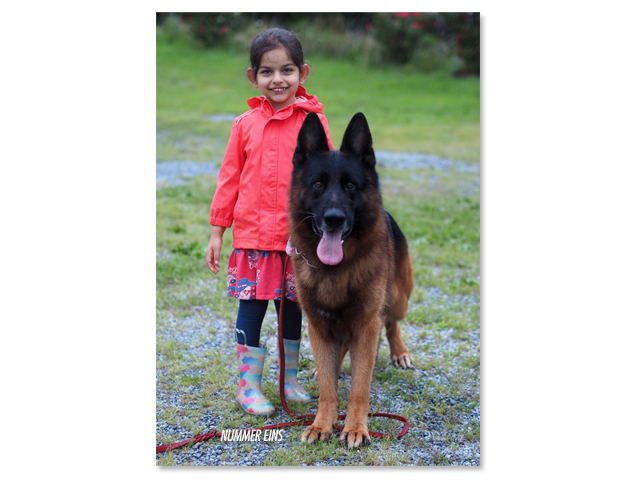One of the most common concerns new German Shepherd owners share is: “My dog barks at strangers, hesitates with new people, and doesn’t want everyone to pet them. Is something wrong?”
The short answer: No. In fact, this behavior is exactly what the German Shepherd Dog was bred to do.
The German Shepherd Temperament
According to the official breed standard, the German Shepherd Dog should be:
- Self-assured: confident, not skittish.
- Even-tempered:balanced, not unstable.
- Attentive and loyal: deeply bonded to its family.
- Watchful: alert to changes in the environment.
- Discerning: able to judge what is a threat and what is not.
Notice what is missing? There is no mention of “friendly with everyone.” Unlike some companion breeds, German Shepherds are not supposed to rush up to strangers with wagging tails. Instead, they are meant to be aloof but confident, aware of new people, cautious until they judge the situation safe, and then neutral once they see no danger.
Bred for a Purpose
To really understand this, it helps to go back to the origins of the German Shepherd Dog. When Captain Max von Stephanitz began developing the breed in Germany in the late 1800s, his vision was clear:
- The dog needed to be a working farm dog, capable of tending and protecting flocks of sheep.
- It had to be intelligent and versatile, able to shift from guiding sheep to guarding property.
- And it had to have the instinct to protect its family and land without being unnecessarily aggressive.
In the countryside, a shepherd’s dog didn’t greet strangers as friends. It observed, it barked, and it ensured nothing got too close without the shepherd’s approval. That guardian instinct, combined with trainability and loyalty, is what made the German Shepherd one of the most respected working dogs in history.
Alert vs. Aggression
When a shepherd barks at a gas station stranger or bristles at a guest who makes eye contact, it is easy to misinterpret this as aggression. But what’s really happening is a normal, instinctive process:
- Alert: “There is something new in my space.”
- Assess: “Is this a threat?”
- Accept or Neutralize: “If it’s safe, I settle.”
This is the protective instinct the breed is known for, and it’s one of the reasons German Shepherds have been trusted worldwide in roles as police, service, and family guardians.
Guests in the Home
In the home, German Shepherds bond most deeply with their family and inner circle. Guests, especially those who are overly assertive, may cause the dog to feel concerned. The best approach for visitors is to remain neutral, no direct eye contact, no rushing in for petting, and no forcing interaction.
As the dog sees that calm, respectful people come and go without conflict, their confidence grows. Over time, they learn to relax more quickly.
A Correct Shepherd
So, when your German Shepherd barks at the door, sizes up a new friend, or prefers not to be petted by every passing stranger, take heart:
This is not a flaw. This is a German Shepherd being a German Shepherd.
The breed was never meant to be indiscriminately friendly. A correct shepherd is loyal, protective, discerning, and steady — a partner who alerts you to what matters, then relaxes once the situation is under control.


Final Thoughts
If you own a German Shepherd, embrace their watchfulness. Support them by setting clear boundaries, guiding them through new experiences, and making sure guests respect their space.
Each time your dog alerts and then calms, you are seeing the very essence of what this breed was created for: a loyal guardian, tuned to its family, confident in its role, and wise enough to know the difference between friend and foe.

